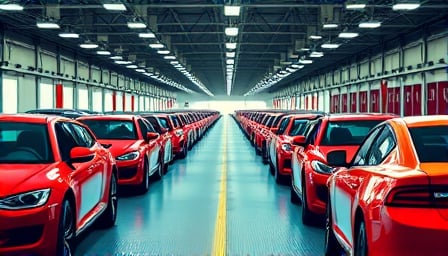Volkswagen AG Faces Multi‑Faceted Market Challenges
Volkswagen AG, Germany’s flagship automobile manufacturer, is currently navigating a confluence of adverse market dynamics that threaten to erode its financial performance and strategic positioning. The company’s equity has been pressured by a sustained decline, regulatory penalties rooted in the historic Dieselgate scandal, and a notable contraction in demand for its electric vehicle (EV) portfolio. The following analysis examines each dimension, contextualising the developments within broader industry trends and macro‑economic forces.
Stock Price Erosion and Technical Indicators
- Recent Price Movements: In mid‑day trading on Thursday, Volkswagen’s shares fell by 2.1 %, a drop that aligns with a broader downward trend observed over the preceding weeks. The cumulative decline has pulled the stock below its 50‑day moving average, a widely used short‑term technical indicator that signals a potential shift in investor sentiment.
- Implications: A breach of this moving average often precedes a continued downturn in price, as it can trigger automated selling by algorithmic traders and signal to institutional investors that the asset has entered a weaker phase. For Volkswagen, this technical signal compounds fundamental concerns such as tightening liquidity in the EV segment and regulatory costs.
- Market Perception: The price erosion reflects heightened risk premiums associated with the company’s exposure to the EV transition, regulatory scrutiny, and competitive pressures from both legacy automakers and new entrants.
Regulatory Fallout from Dieselgate
- Fine and Legal Proceedings: Volkswagen has been fined for its role in the Dieselgate emissions scandal, a penalty that carries both immediate financial costs and longer‑term reputational damage. The company has announced an appeal to the Federal Constitutional Court, signaling an intention to contest the ruling.
- Financial Impact: The fine imposes a direct hit to profitability, while the uncertainty surrounding the appeal introduces potential for additional penalties or remedial obligations. Depending on the outcome, the company may face further compliance costs, increased scrutiny from regulators, and a need for more robust emissions verification systems.
- Reputational Consequences: Public trust, a critical asset in the automotive sector, has been eroded by Dieselgate. The appeal may mitigate some damage if the court rules in Volkswagen’s favour, but prolonged litigation could sustain negative sentiment among consumers, investors, and policymakers.
- Sectoral Context: The EU’s tightening emissions standards, coupled with the global push toward zero‑emission vehicles, means that legacy automakers must invest heavily in emissions‑compliant technologies. The fines serve as a reminder of the regulatory risks that can materialise when compliance is insufficient.
Demand Slowdown in the Electric Vehicle Market
- Production Adjustments: Volkswagen has temporarily closed two German plants due to a slump in EV demand, reducing its production volumes and potentially disrupting supply chains. The closure underscores a mismatch between the company’s high investment in EV development and the current market uptake.
- Competitive Landscape: The EV market has become increasingly crowded, with established players such as Tesla, General Motors, and Hyundai as well as new entrants like Rivian and Lucid. These competitors often benefit from early‑market brand recognition, vertically integrated battery supply chains, or more agile production models.
- Economic Drivers: Macroeconomic factors—including rising interest rates, inflationary pressures, and a potential slowdown in discretionary spending—have tempered consumer appetite for premium EVs. Moreover, geopolitical tensions and supply‑chain disruptions have heightened uncertainty in the automotive sector.
- Strategic Repercussions: The demand dip forces Volkswagen to reassess its production capacity, potentially leading to workforce reductions, plant re‑tooling, or strategic partnerships to share risk. In the longer term, the company will need to balance its investment in EV technology with the realities of consumer adoption curves and regional demand variations.
Interconnections with Broader Economic Trends
- Energy Transition: The shift from internal combustion engines to electric propulsion is accelerating, driven by climate policies and consumer preferences. Volkswagen’s challenges illustrate the broader risk for legacy automakers: premature scaling of EV production can lead to inventory glut and price pressures if demand lags.
- Technological Disruption: Advancements in battery chemistry, autonomous driving software, and vehicle‑to‑grid integration are reshaping the competitive landscape. Firms that fail to adapt rapidly risk losing market share.
- Supply‑Chain Resilience: The pandemic exposed vulnerabilities in global supply chains. Volkswagen’s plant closures highlight the need for diversified sourcing and flexible manufacturing to withstand shocks.
- Financial Market Sentiment: Equity markets have become more sensitive to non‑financial risks, such as regulatory fines and reputational damage. Volkswagen’s stock performance reflects the broader trend of investors demanding higher risk premia from firms in transition phases.
Conclusion
Volkswagen AG’s current predicament is emblematic of the complexities confronting automakers in an era of rapid technological change and heightened regulatory scrutiny. The confluence of stock price erosion, legal penalties, and declining EV demand underscores the importance of disciplined capital allocation, robust compliance frameworks, and agile manufacturing strategies. While the company’s historical strengths—such as brand heritage, engineering expertise, and global footprint—remain valuable, sustained success will depend on its ability to align these assets with evolving market dynamics and to manage the intertwined financial and reputational risks that arise in the transition to a low‑emission future.
